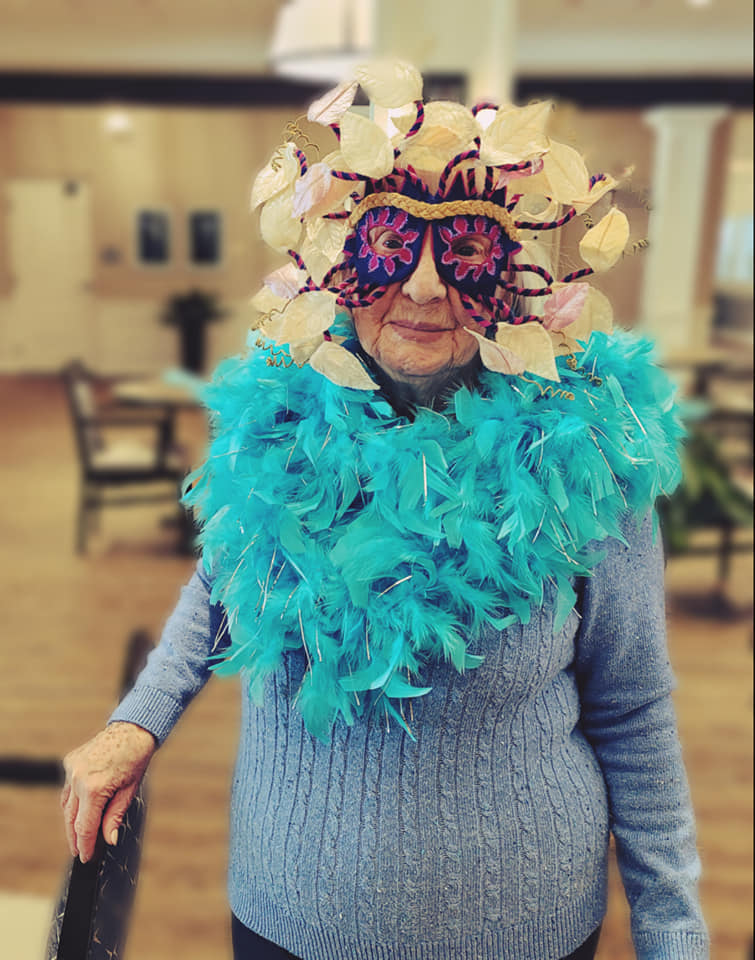
February 17, 2023
As part of Arrow’s ongoing Diversity and Inclusion Series, Arrow resident Lois Davis met with Christopher Muscato, an adjunct professor at the University of Northern Colorado, to discuss the festival of Carnival.
Carnival is an extended holiday that kicks off on Twelfth Night (the sixth of January, or Three Kings Day) and leads up to Mardi Gras (or Shrove Tuesday) in mid-February. It’s a time of parties, eating and drinking, and having lots of fun before Lent begins on Ash Wednesday and “everything calms down.”
Did you catch all the names? There are many, reflecting Carnival’s multicultural background and its connection to Catholicism. Mardi Gras is French for “Fat Tuesday,” which is also called Shrove Tuesday.

“I couldn’t find ‘shrove’ in the dictionary,” Davis said. “I always thought it meant pancakes!” Her mother always made pancakes on Shrove Tuesday. “Shrove” has something to do with atonement, but what? And what do pancakes have to do with forgiving your sins?
Muscato helped clarify. The word “shrove” comes from “shrive,” which means the confessing, penance, and absolution of sins and the preparation of your soul before Lent. Pancake suppers are one of the many examples of Carnival celebrations: A final indulgence before practicing Christians atone for sins during the forty days of Lent.
To understand the relationship between the partying of Carnival and the austerity of Lent, Muscato provided some historical context. Around 500 CE, the Church wanted to consolidate the way people practiced the religion, and one way to do that was to co-opt existing festivals. Romans had holidays throughout the year designed for servants and slaves to blow off steam. Roles would be reversed: Masters would serve, and slaves would throw food at them. Not just a fun celebration, Muscato added that it was also an effective way to prevent slave rebellions.
It was in Italy around the year 600 CE that Pope Gregory 1 laid out how Catholics should practice Lent and celebrate the time before it. This was where Lent became defined by fasting. To contrast the period of penance, the two months beforehand became devoted to enjoying life and focusing on earthly pleasures. Carnival is about joy and “a little bit of” excess, but, Muscato clarified, not necessarily “sinfulness.” In an era when most didn’t have time in their day for pleasure, it was meant to give people a chance to indulge.
As Carnival became adopted in different parts of the world, it adapted. In Canada, where Davis used to live, Carnival is in the middle of winter so all the festivities center around ice and snow: Dog sledding, ice carving, snow baths (!). While for half the world Carnival is in summer, so activities like water fights or food fights prevail.
Costuming is a vital aspect of Carnival and is another example of the way that cultures have influenced the celebration. Davis noted the link between the aboriginal dances of Central and South America and the bright colors and beautiful feathers we see in Carnival costumes. Music, too, became an inseparable part (at which point in the conversation both Davis and Muscato did a little samba dance in their respective chairs). Bright colors, feathers, music – and nakedness, Davis added, with people wearing just a few beads to hide “critical parts of their bodies.”
This led to an interesting bit of trivia: The first documented mention of immodestly dressed women in New Orleans was in 1889, which is around the time that organized parades as we know them first kicked off.
Venetian masks vary from the American masks and play more with gender and animal motifs. Their style is largely drawn from the traditional Commedia dell’arte, where masks symbolize archetypal characters (the fool, the know-it-all doctor, the devious servant). These masks and their use during Carnival go back to Roman “reversal rituals.” Carnival is a time to challenge status and disappear into a different identity: Peasants can be royals, accountants can be plague doctors.
Are the masses of people celebrating Carnival in New Orleans and Venice looking at this as a Christian celebration, or is this just something they do in the middle of winter to feel good before the snow goes? Muscato imagines it’s a mix. People celebrate for different reasons. Places where Carnival is a substantially recognized event tend to be more Catholic, so people are raised with this as part of their faith. When we think of Mardi Gras in New Orleans, we tend to think of the big tourist spectacle, but it is a lot more nuanced and rich than what we see in the headlines. There are a mass of cultural traditions surrounding Carnival that have been recognized by UNESCO as intangible heritage. For some it’s a big party, for others it’s a significant opportunity to celebrate community, and for others still, it remains connected to the Liturgical calendar and their faith.
And once Carnival is over, Davis wondered, do the celebrants then observe forty days of Lent? Muscato’s answer: Maybe.
Before the end of the call, Davis donned her own fantastic Carnival costume: A purple mask with a towering headdress of feathers black, purple, red, and peacock. Muscato’s infant twins also made a wriggling appearance with their own bright purple and green masks.
To experience their delightful conversation in its entirety, follow this link!
Saint Charles, Missouri-based Arrow Senior Living manages a portfolio of communities that offer varying levels of care, including independent living, assisted living, and memory care. Each and every senior living community supports residents by focusing on dignity, respect, and quality of life. The programs and amenities offered are selected to provide only the highest standard of quality and comfort.
Find an Arrow community near you
Work at Arrow Senior Living
Arrow Senior Living Management serves and employs individuals of all faiths, regardless of race, color, gender, sexual orientation, national origin, age or handicap, except as limited by state and federal law.